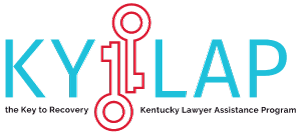How Can We Help?
How KYLAP Can Help
- Making assessment referrals to accurately identify a problem
- Providing treatment/therapy/rehabilitation referrals
- Offering peer support
- Establishing monitoring and compliance contracts
- Judge/Lawyer/Law student recovery meetings
- The KYLAP Foundation may be able to financially assist with the cost of assessments, counseling, or treatment.
Mental Health
As a judge, you may develop mental health problems due to the demanding nature of the profession. You do not have to navigate these issues alone. Help is available and readily accessible.
Some common mental health problems include:
- Anger Management
- Anxiety
- Depression and Suicide
- Stress and Burnout
Addiction
- Process Addiction: When we think of addiction, we usually think of drugs and alcohol. However, the term also refers to compulsive behaviors like gambling, sex, eating and spending money. When left untreated, process addiction can impact a judge’s ability to practice law. Process addictions are often coupled with mental health issues such as anxiety.
- Substance Use/Addiction: Drug or alcohol use disorder is defined by having two or three symptoms of addiction. Many people experience alcohol or drug use problems but are able to stop using or change their patterns without progressing to addiction. The most severe form of substance use disorder is addiction: a physical, chronic disease that typically requires long-term treatment. Types of addiction include: Nicotine, alcohol, illegal drugs and prescription drugs.
Wellness
Wellness is an active process of becoming aware of and making choices toward a healthy and fulfilling life. It is more than being free from illness; it is a dynamic process of change and growth.
- Compassion Fatigue: Compassion fatigue is the cumulative physical, emotional and psychological effects of continual exposure to traumatic or distressing events when working in a helping capacity. Exposure to client distress and trauma is one of the largest factors of compassion fatigue.
- Grief and Loss: Grief is a natural response to loss. Grief can also be a normal response to change because change in life brings loss in some form, whether big or small. Grief usually throws us off balance and into chaos. Unfortunately, the world does not stop to allow us adequate time to grieve. We have to continue on life’s path while simultaneously grieving. The good news is that you are not alone. Everyone suffers loss. Grief counseling can help.
- Over-Functioning: You probably went into law and wanted to be a judge because you wanted to help people who needed it and wanted to give citizens a voice. You wanted to make your community a better place. What can happen over time is that you may over identify with the “rescuer” role. This role then bleeds into other areas of your life. You begin to place such a low emphasis on your needs and wants and only focus on the needs of others around you. You may even feel guilty when you want to do something for yourself.
- “Aging of the Bar”: Today, we see a lot of older judges working late into their life. Unfortunately, at a certain age, cognitive issues may start to develop, and decision making may start to decline. Confusion, personality changes, withdrawal and memory changes can all have a negative impact on practicing law at a later age. Our program can help you transition out of the profession.
- Dementia: The early signs of dementia are very subtle and may not be immediately obvious. Early symptoms also vary. Usually, people first seem to notice that there is a problem with memory, particularly in remembering recent events.
- Other common symptoms include:
- Apathy and withdrawal
- Confusion
- Loss of ability to do everyday tasks
- Personality change
- Click here for a checklist of common dementia symptoms. If there are several that you answer “yes” to, a doctor should be consulted for a complete examination. https://www.betterhealth.vic.gov.au/health/ConditionsAndTreatments/dementia-early-signs
Kentucky Lawyer Assistance Program
KYLAP is a program of the Kentucky Bar Association that offers help to lawyers, law students, and judges who are struggling with mental health issues, such as depression, alcohol and drug abuse, stress, compulsive gambling or any other condition that may adversely impact the individual’s personal or professional life.
Contact us at (502) 226-9373 to get help for any Kentucky lawyer in need.
Pursuant to Supreme Court Rule 3.990, all communication with KYLAP is confidential.
National Suicide Prevention Lifeline:
1-800-273-TALK (8255)
Get in Touch. Get Involved.
The KYLAP Foundation needs your support to enhance the services we can provide to lawyers in need.
P. O. Box 1437 | Frankfort, KY
Call Us: (502) 226-9373
Need Help Now?
Suicide help:
Call 988
or text 741741
More help…
Click here for help with:
Alcohol and Substance Abuse Disorder
Depression
Stress and Burnout
Compulsive Gambling
Eating Disorders
Who We Help
KYLAP Foundation
The KYLAP Foundation needs your support to enhance the services we can provide to lawyers in need. Click here to learn more.


